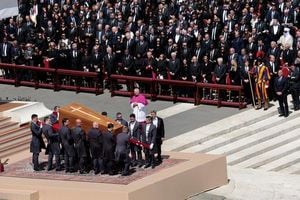Channel 4 is set to air the gripping new drama "Brian and Maggie," which delves deep inside one of the most infamous political interviews ever conducted, focusing on the relationship between former Prime Minister Margaret Thatcher and journalist Brian Walden. The two-part series premieres on January 29 and 30, 2025, at 9 PM, and it promises to regale audiences with the intricacies surrounding Thatcher's last televised interview, which some argue precipitated her resignation.
Starring the renowned Steve Coogan as Brian Walden and the acclaimed Harriet Walter as Margaret Thatcher, the show explores the complex dynamics between two formidable figures consumed by political tensions yet connected by mutual admiration. Directed by the BAFTA-winning Stephen Frears and penned by RTS award-winner James Graham, "Brian and Maggie" brings to life the insightful, if tumultuous, exchanges surrounding Thatcher's leadership and its eventual unraveling.
Viewers will be transported back to October 29, 1989, when Thatcher appeared on Walden's program, "The Walden Interview," following the resignation of her Chancellor, Nigel Lawson. The resignation had garnered significant media attention, prompting Walden to launch fierce questions directly at the prime minister. During the 45-minute interview, many pivotal moments transpired, including Walden confronting Thatcher about her perceived authoritarian style and querying whether she might have swayed Lawson's decision to leave. Notably, the exchange ended with Thatcher accusing Walden of being domineering, highlighting how the interview would forever change the perception of her leadership.
Identified as one of the media's most feared interviewers, Walden’s past as a Labour MP helped him navigate the political terrain uniquely. "I am not leaving because of any disenchantment with the Government," he stated after stepping away from politics to focus on journalism, describing his shift as one driven by positive endeavors rather than disillusionment. His thoughtful yet pressing interview style earned him respect from both sides of the political spectrum, including Thatcher herself, who enjoyed their earlier discussions.
Meanwhile, Walter's portrayal of Thatcher seeks to capture the Iron Lady’s complexity without succumbing to cliché impressions. She remarked, "I decided I don’t look anything like Thatcher... I won’t go... attempting to do a direct impression but to just try and get behind the thinking of this person." This approach promises to deliver authenticity and depth to the character, encouraging audiences to see beyond the controversial politician's public persona.
The narrative thread also highlights the evolution of Walden and Thatcher's relationship over the years, moving from mutual respect and friendship to tense confrontation during their final televised meeting. Both shared moments of levity, with Walden having previously referred to Thatcher as “the master spirit of our age.” This heart-wrenching transition effectively symbolizes the greater political turmoil and eventual fallout faced by the Conservative Party.
Emerging from this pivotal moment, political commentator John Campbell noted the interview's impact: “Brian's journalistic instinct combined with her lack of candor resulted in the devastating expose we witnessed.” This acknowledgment reveals how such moments are not only anecdotal but can shift public perception and reshape political futures.
"Brian and Maggie" serves not only as entertainment but also as a reflection on the responsibilities of political journalism. Writer James Graham acknowledged, "I hope it asks a big, important question... the political interview is in crisis," underscoring the relevance of Walden and Thatcher's dynamic to contemporary political discourse.
With promises of powerful storytelling and masterful performances, the two-part drama aims to shed light on the consequences of political discourse, the fragility of power, and the very nature of leadership. The compelling tale behind this remarkable interview and the fallout resonates significantly today, making it necessary viewing for anyone interested in the history of political power.
This production adds to the growing body of work reflecting on Thatcher's legacy, challenging audiences to reconsider how political narratives are shaped through the lens of media engagements. Tune in as Channel 4 unveils "Brian and Maggie," where history, drama, and politics collide.



